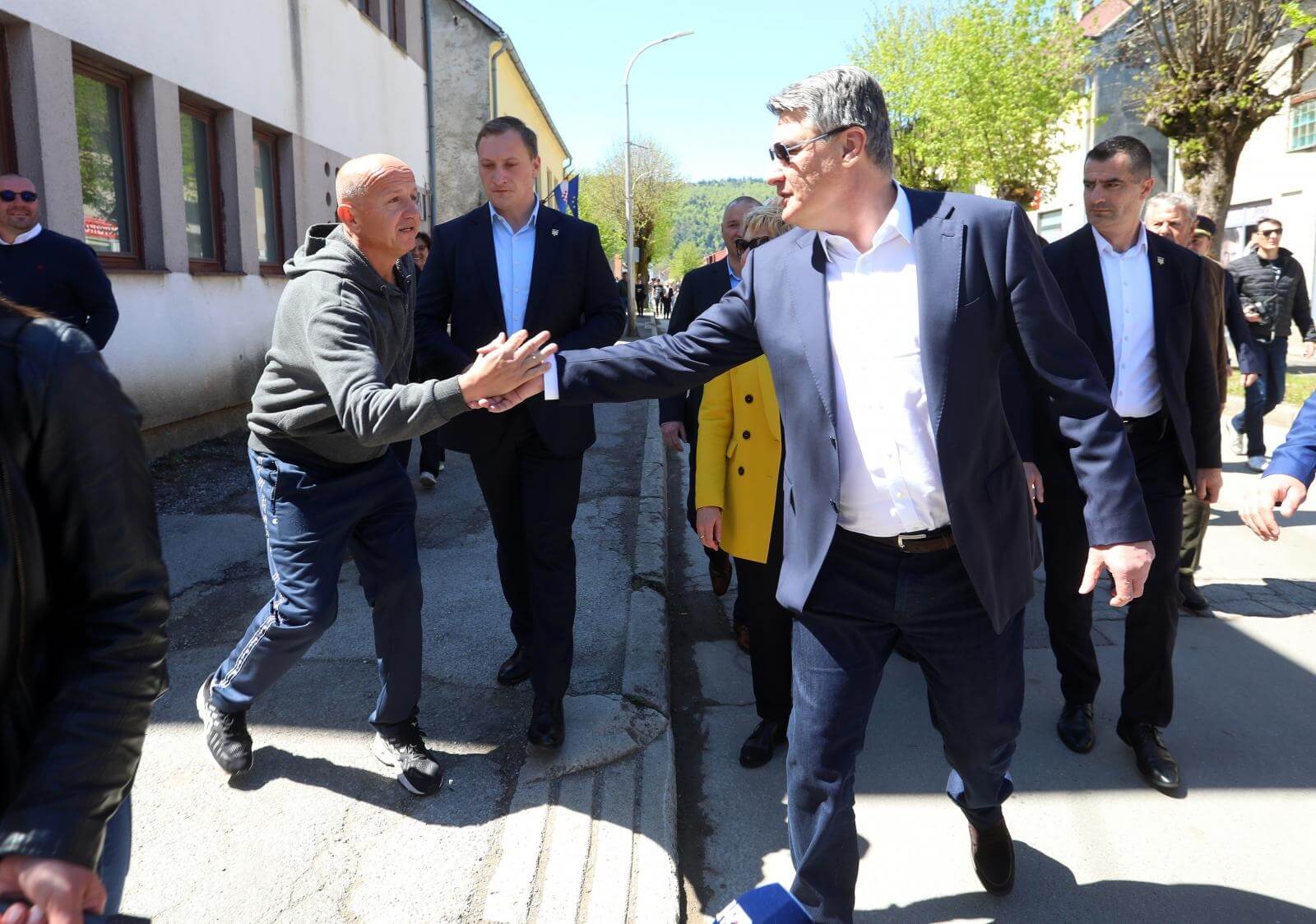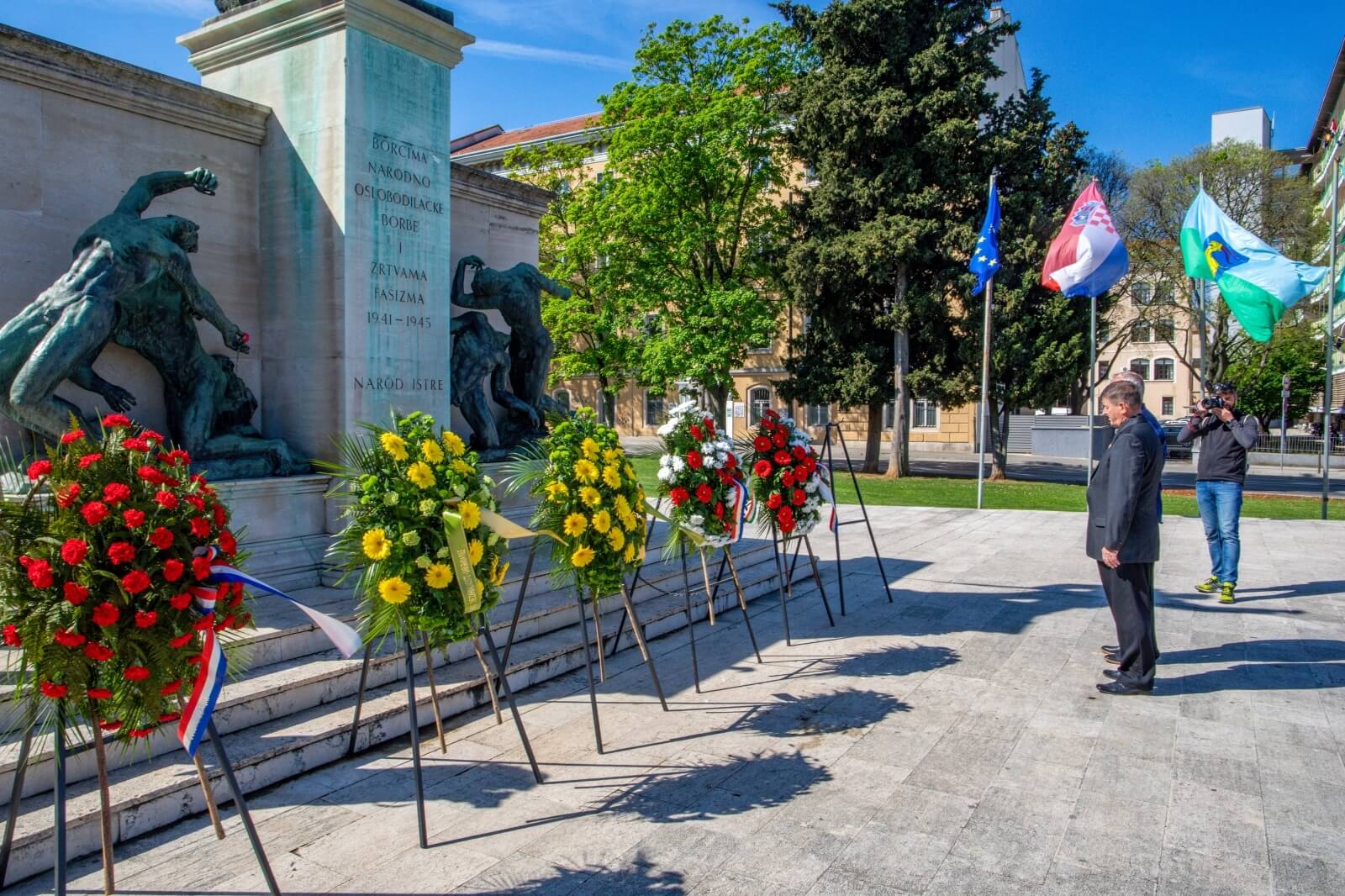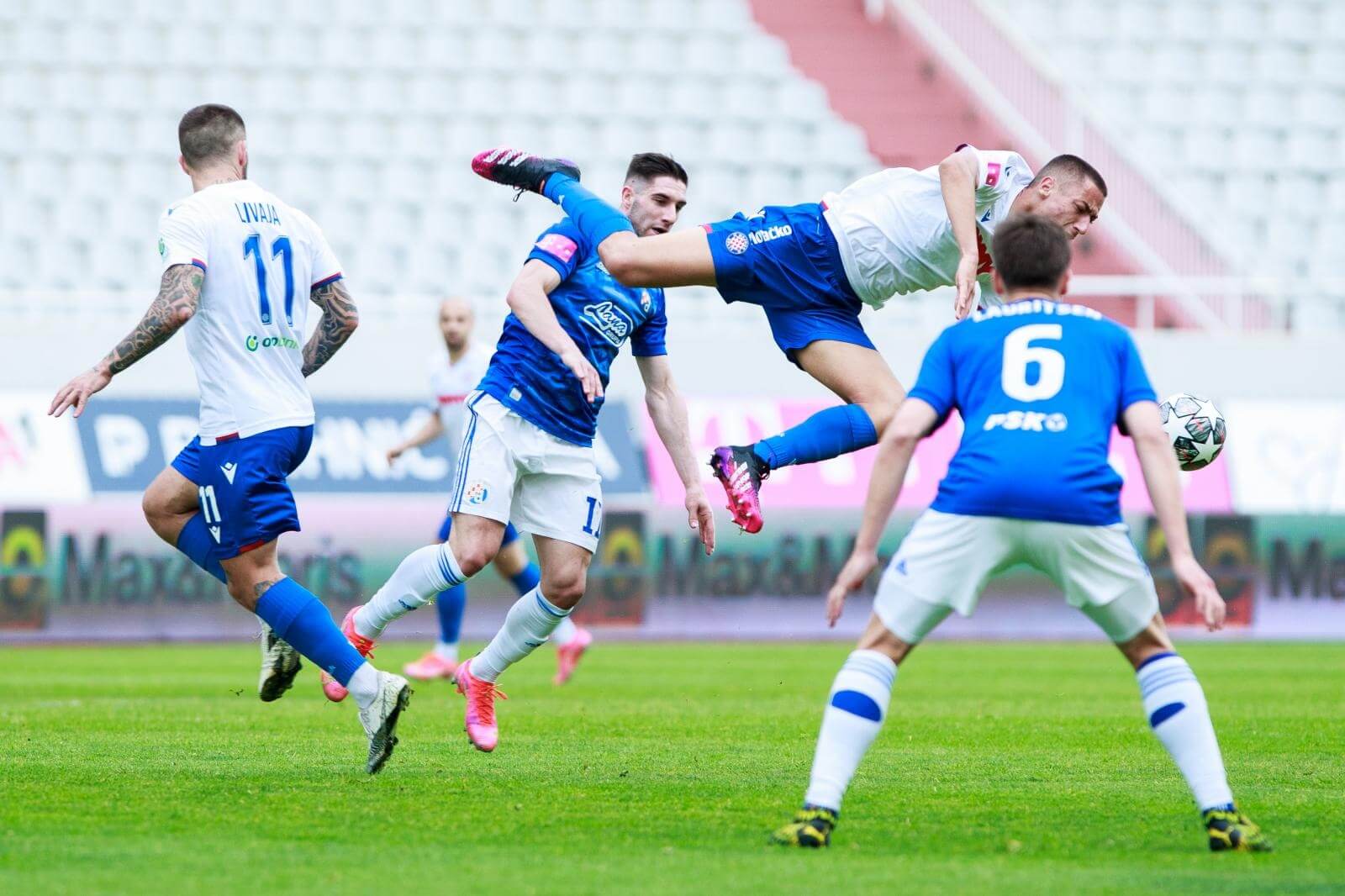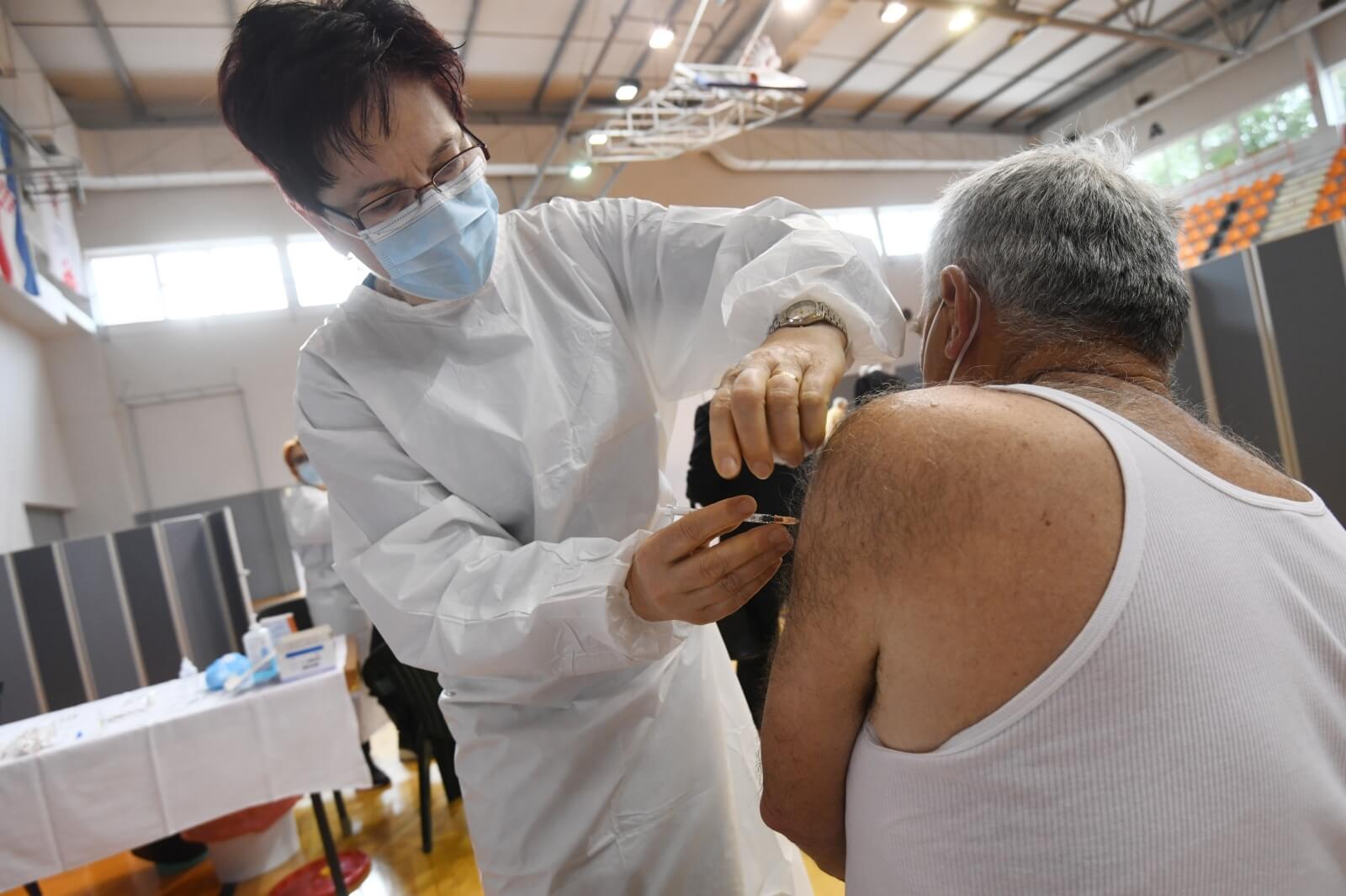Innovative Eco Approach to Recycling Christmas Trees - Goats Helping
January 13, 2023 - Since the needles of Christmas trees have a beneficial effect on the digestion of goats and have a positive impact on the taste of cheese; the benefits are multiple.
As Poslovni / Novi list write, encouraged by a similar practice abroad, the Pula utility company Herculanea donated Christmas trees after the holiday to the Kumparička goat farm to feed their goats in Cokuni, a tiny village in the municipality of Marčana, the Pula city administration reported. Last year, Herculanea experimented with donating some Christmas trees to the Kumparička goat farm, and that became a real hit on the farm because the goats happily and thoroughly cleaned them.
"Although it was possible to put them away and dispose of them with other green waste, Pula Herculanea is taking the collected Christmas trees to the Kumparička goat farm in Cokuni this year as well. Their goats enjoy the aromatic taste of the green needles, and since the needles have a beneficial effect on the goats' digestion and have a positive effect on the taste of cheese, the benefits are multiple," said the director of Herculanea, Robi Fuart.
He added that the Christmas trees "grew in the forest, then decorated homes for the Christmas and New Year holidays, and finally became food for the goats from which we get food."
On this occasion, on Thursday, the first thirty trees without roots were brought to the farm in Cokuni, and the donation will continue while the campaign to collect them continues. As for Christmas trees with roots, which the citizens donated, Herculanea will plant them in Pula's green areas, just like in previous years.
Herculanea invites citizens to continue disposing of Christmas trees near the waste containers in their areas and at the recycling yard in Valmade. Pula Herculanea will collect them until January 20th and take them to the Cokuni goats for "recycling."
For more, make sure to check out our dedicated Lifestyle section.
Croatian Copenhagen: 170 Kg Waste per Resident is Separated in Koprivnica
October 12, 2022 - In Koprivnica, you will not find areas full of garbage. Or bags in the city centre waiting to be picked up. In Koprivnica, neighbours don't snitch on others because, in Croatian Copenhagen, everyone knows how to separate waste.
As RTL reported, "Every house here has a small composter, and everything is separated. Well, no problem. There are plenty of containers, there are recycling yards. You just need education and discipline," said Ksenija from Koprivnica.
"Did you know that Koprivnica is in the top 5 cities for waste separation? - I didn't. - You didn't know? - No. - Do you separate waste? - Yes. We are well trained here, paper one bin, plastic other, food in the third..." said Zlatica from Koprivnica.
If you thought that Koprivnica could only boast of Vegeta or Pajo Kanizaj - you were wrong. Eighteen years. For so long, have they known where paper, metal, and plastic go. They are our Switzerland; they separate waste better than the Parisians. They are better than Zagreb and Split. They are number two in waste separation in Croatia. Fifty-five percent was their performance for last year. They separate 170 kilograms of waste per resident. That's half a kilo every day. They promise that this year the stats will be even better.
Here is what they say about the people of Zagreb:
"Of course, it all makes sense, but people need to get used to it. It seems revolutionary to them now, maybe it came too suddenly, but people will get used to it. If the city insists," commented Alojz Balog. Because in Koprivnica, they did insist. You put plastic in paper, cans in mixed recycling, or cooked food in organic waste. It doesn't matter - instead of a fine, they'll leave a note on the bin. "If people often make mistakes, let's leave a message, let's warn them. There aren't many problems with separation. Sometimes they put a tetrapak in paper when it should go in plastic, so we leave a note of that," said Hrvoje Kuzmic, a worker at Komunalac.
They have boxes, underground tanks, overhead bins, recycling yards, and disposal sites for cooking oil; everything is possible in Koprivnica. And while in Zagreb, there are blue, brown, and yellow bags, there are none in Koprivnica.
"With mixed recycling, we immediately started with bins; for the rest, we started with bags, but then we decided not to create additional waste because it doesn't make sense, and now we have bins for all four types of waste," said the director of the waste management sector, Saša Grubacevic. This means that if you get a bin annually, you pay HRK 74 for the 120-litre one, which includes one removal per month.
As for biowaste - they make compost from it, which they use to fertilise gardens, fields, and flowers in the city. And while in natural conditions, the process would take months, in Koprivnica, they produce organic fertiliser in eight weeks. And everyone wants to buy Koprivnica's fertiliser - from Zagreb to Zadar.
"We make first-class compost with the bio-waste we collect at the doorstep. It is further used in agriculture. People can buy it here; they can get some for free sometimes," said Grubacevic.
It wasn't easy at first. But they learned quickly. Now everyone, from kids in kindergarten and the elderly in nursing homes, knows how to separate. They manage their waste so well that the Brazilian embassy asked for advice. "We are Podravci. We have learned to deal with all issues," says Balog.
For more, make sure to check out our dedicated Lifestyle section.
Međimurje County Champion in Municipal Waste Sorting
ZAGREB, 15 Aug, 2021 - The Croatian municipal waste sorting champions, small municipalities in the northern Međimurje County, stand next to the most advanced European regions, while the national average remains below 20% and some cities, including county seats, are still not sorting any waste.
The data comes from an Environment and Nature Protection Bureau preliminary report on municipal waste sorting in 2020.
Croatia was supposed to recycle 50% of its municipal waste by 2020, so the fact that the percentage rose from 11.52% in 2018 to 18% last year does not make experts optimistic.
Of the ten municipalities and towns with the highest sorting percentage, nine are in Međimurje County, followed by Krk island and several other cities.
Of the 556 local government units in Croatia, Belica Municipality ranks first, sorting 79.76% of its waste, followed by the town of Prelog with 70.98%.
Five local governments which sort between 60 and 70% of their waste are also in Međimurje County, as are five sorting between 50 and 60%.
In the latter group are also the town of Koprivnica and seven local government units on Krk. This island in the northern Adriatic was the first in Croatia to sort waste and is close to becoming an energy self-sufficient island without carbon emissions. The group also includes Semeljci in Osijek-Baranja County.
All those local government units have met the waste-sorting target set by the EU.
The list of local government units sorting zero of their waste is much longer, the champions being Karlovac and Dubrovnik-Neretva counties.
Plitvice Lakes Municipality, where the national park of the same name is located, is one of six in Lika-Senj County that sort zero of their waste, including the county seat Gospić.
Virovitica-Podravina County also has six local government units sorting zero of their waste, while Šibenik-Knin and Zadar counties each have five, Brod-Posavina, Sisak-Moslavina and Split-Dalmatia counties each have four, Zagreb County has two, and Bjelovar-Bilogora and Primorje-Gorski Kotar counties each have one local government unit not sorting any waste.
For more on lifestyle, follow TCN's dedicated page.
For more about Croatia, CLICK HERE.
Highlights of the Week: 5 Big Events in Croatia from May 3-9, 2021
May 7, 2021 - TCN's regular retrospect of Highlights of the week, through the selection of TCN's reporter Ivor Kruljac.
President Milanović loved by locals in Plaški. Firefighters quickly reacted to the fire in Zagreb recycle yard. Pula celebrated its liberation while Šibenik received new doses of coronavirus vaccines. Dinamo and Hajduk end their match in a tie. Overall another interesting week in Croatia, and here are more details on all highlights.
Highlights of the week: President Milanović loved in Plaški county

© Kristina Stedul Fabac/ PIXSELL
Croatian president Zoran Milanović visited Plaški county near Ogulin on Tuesday to visit the newly-build Firefighter's home and Plaški Culture Home. The locals welcomed president Milanović with ovations, and many use the opportunity to handshake and take a photo with the president. As Večernji List reports, Milanović took the visit as an opportunity to comment on the hate speech incident at Borovo Selo. He stated that the President of Serbian National Council Milorad Pupovac and Croatian Prime Minister „should use the police, but they don't, they are causing incidents.
Highlights of the Week: Pula celebrating its liberation in WW2

© Srecko Niketic/ PIXSELL
Pula celebrated its annual liberation day and the Pula City Day, marked on May 5. In Tito's park, the traditional commemoration to the fallen WW2 soldiers of Tito's partisan army saw Tiziano Sošić (president of Pula City Council), Elena Puh Belci (vice mayor of Pula), Aleksandar Matić (chief of the City of Pula Office) and Fabrizio Radin (vice-county ruler of Istria county) paid their respects. Representatives of associations of anti-fascist fighters and anti-fascist of the city of Pula were present too.
Highlights of the Week: Dinamo and Hajduk end with an even score 1:1

© Milan Sabic/ PIXSELL
Hajduk and Dinamo's eternal opponents played another game at Hajduk's home of Poljud Stadium in Split on Wednesday. The match was the 22nd round in Croatian First League, and fans couldn't wait for it as the game was postponed.
Hajduk opened the match well and had a chance to take the lead in the first 20 seconds. Kačaniklić received an excellent long ball and ran on the right side. He rushed into the penalty area and shot diagonally, but Livaković came out and closed his corner. Dinamo improved and took the lead in the 16th minute with a goal by Majer, and Livaja returned the favor in the 44th minute. Diamantakos hit the crossbar in the final minutes of the match but without success.
After three victories in the previous three clashes with Hajduk this season, Dinamo failed to achieve maximum performance and almost mathematically secured the title but entered the last four rounds with a seven-point advantage over Osijek. The fail happened despite Dinamo facing Hajduk with the strongest possible lineup.
Highlights of the Week: Vaccination in Šibenik continues successfully

© Hrvoje Jelavic/ PIXSELL
Larger quantities of vaccines came to Šibenik on Friday, allowing vaccination in Baldeki Sports Hall to go without problems for the second day in the row. The vaccination attracts a number of citizens, so the area got quite crowded.
Highlights of the Week: Recycling yard in Zagreb on fire, reasons unclear

© Matija Habljak/ PIXSELL
Zagreb's recycling yard, located on Sarajevska Cesta in Novi Zagreb, was victimized by fire but quickly localized and put under control on Tuesday. The fire caught four containers, and 21 firefighters with six fire trucks rushed to the field. Police investigated the cause of the fire, but the reason is, for the moment, unknown. Firefighters managed to operate despite the lack of hydrants, and the thick white smoke was noticed by citizens who live in the buildings close to the yard, reported Večernji List.
To learn more about Croatia, have a look at our newly launched TC website.
For more about news in Croatia, follow TCN's dedicated page.
Grant Agreement Signed For Composting Plant in Metković
ZAGREB, 26 March, 2021 - A HRK 12.5 million EU grant agreement for the construction of a composting plant in the southern town of Metković was signed on Friday by Economy and Sustainable Development Minister Tomislav Ćorić and the director of the local Čistoća waste management company, Tomislav Jakić.
The project, which will be implemented as part of the Operational Programme Competitiveness and Cohesion 2014-2020, is worth more than HRK 24 million, of which 50% is co-financed by the EU.
Ćorić said that the composting plant would serve Metković as well as Opuzen and neighbouring communities.
The plant's annual capacity is 5,000 tonnes and it guarantees that biodegradable waste in the River Neretva valley will be managed in the best way possible, said the minister.
Dubrovnik-Neretva County head Nikola Dobroslavić said that Metković was the most advanced local government unit in terms of waste management.
For more about ecology in Croatia, follow TCN's dedicated page.
Environment First: Knin To Get Recycling Yard
A 2.2 million kuna project to benefit the environment in and around Knin.
43 Tonnes of Paper Collected and Recycled by Elementary School Students in Pula
Children are the best ambassadors when it comes to nature preservation and environmental practices
Zagreb’s Problems with Trash Continue in the New Year
A lot has been said and written about the problems with waste management in Zagreb in recent period, especially in terms of reduced cycle of collection of municipal waste from the buildings and attempts to improve recycling rate.
1.9 Million Kuna in EU Funds Approved for Slivno Municipality Recycling Yard
Good news for the Slivno Municipality!
How to Recycle Tetra Pak Packaging in Zagreb?
I admit I’ve been doing it wrong.


